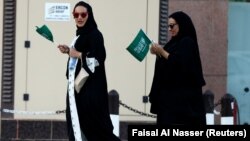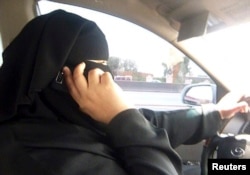Saudi King Salman's recent decision to grant women more rights won praise in some quarters and grumbles of discontent in others. Despite the newly-won freedoms, though, Saudi women are far from enjoying the same rights as their Western counterparts.
The royal decree permits women to make a certain number of decisions without the permission of a male guardian. When Saudi TV announced it with little fanfare last week, it said the move conforms with Islamic "sharia" law.
Legal adviser Hassa al Duleimi told state TV the decision was based on a complaint over equality of the sexes in obtaining services from the government:
She said Saudi women will now be able to obtain various government services, including the right to enroll in a university, the right to open a bank account, and the right to leave prison after finishing a sentence without the agreement of a male guardian.
Other freedoms missing
Other freedoms — like requesting a passport, traveling abroad, or getting married — will still require the permission of a male family member.
Writer Maha Ba'ashan also told Saudi TV that the government, human rights groups and the media need to better educate women about their rights.
She said women often are not aware of their rights, such as the right to equal wages for the same job, or the right to work in about 30 different professions. She pointed out there are now 30 women who belong to the consultative al- Shoura council.
The decree granting women new rights followed the election of Riyadh to the U.N. Commission on the Status of Women at the end of April. Some human rights groups and activists criticized the U.N. vote. One Canadian lawmaker said she was "appalled" by the election of Saudi Arabia, calling the kingdom a "gender segregationist theocracy."
Human Rights Watch noted that three European governments voted to allow Riyadh to join the commission, but that the Belgian prime minister later regretted his government's decision.
HRW also questioned how a "repressive" Saudi government could serve on a commission whose stated goal is the "promotion of gender equality and the empowerment of women."
On social media, Saudi activists continue to wage a campaign to urge King Salman to relax what they perceive as the archaic restriction preventing women from driving. A number of women have driven their cars in public in recent years to protest the ban, but so far they have failed to sway public opinion.
The king's son and Deputy Crown Prince Mohammed Ben Salman told journalists recently that it is a societal norm that forbids women from driving, rather than a religious restriction. He added that Saudi society is still not convinced of the merits of women being allowed to drive and that many think that there are serious negative consequences to allowing them to do so.
Conservative Saudi religious leaders frequently oppose moves to give women more rights, although the late King Abdallah decided several years ago to give women the right to vote and run for local elections. Saudi society is still gender-segregated and women are required to be covered from head to toe while in public.
Saudi Mufti Abdul Aziz Al Sheikh, nevertheless, defends the kingdom's treatment of women, maintaining that Islam gives women significant rights and has freed them from the injustices that they faced in pre-Islamic society.
Writer Ba'ashan, for her part, stresses that many sources of inequality between men and women stem from Saudi societal practices, rather than any factual basis in sharia law. "The public," she said, "needs to be told that many of these practices are wrong and that they have no basis in law."





